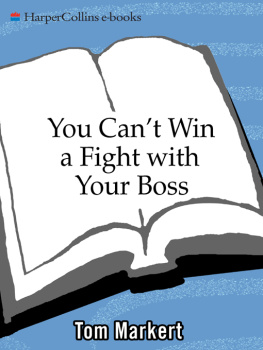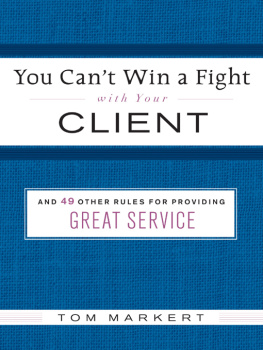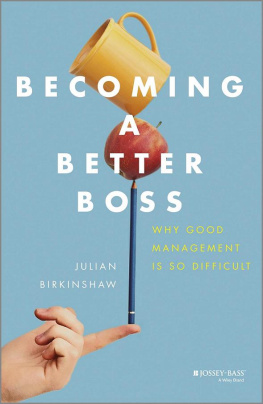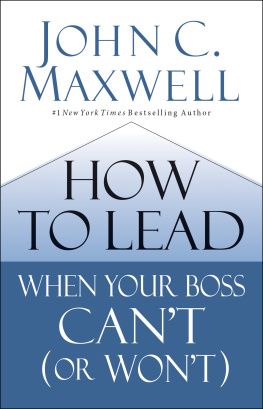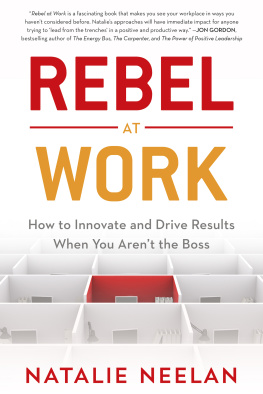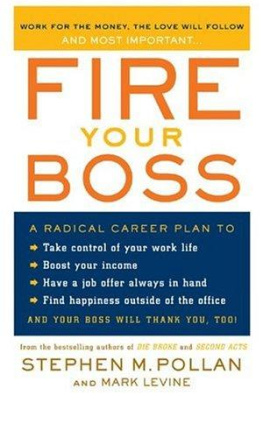This book is dedicated to five very important people in my life.
My parents, Tom and Monnie Markert. They gave me my values, my work ethic, and my sense of humor.
My in-laws, Anne and Bill Elwell, who allowed a snot-nosed kid to marry their daughter and then proceeded to treat me like another son. Sadly my father-in-law, Bill, passed away after a fight with cancer, but he will always be remembered as an awesome man. I learned a lot from you, Bill!
And most importantly, my wife, Sarah. She is the cornerstone of our family. With my travel schedule and job requirements, it could not work without her. Plain and simple.
CONTENTS
A journey of a thousand miles must begin with a single step.
Chinese philosopher Lao-tzu said this during the sixth century B . C . It is fantastic advice, and it has lived through the ages. The fact that you are reading this booktaking a single stepmeans you will have an advantage over your competitors.
You can learn from the past as well as from others, and certainly from your own successes and failures. The process of learning will accelerate your path to correct action, and taking correct action is what will get you ahead inside companies of any size at a faster pace.
Working your way up inside a company can be a great adventure, even a wild ride. There is no magic formula to ensure success, but there are some black-and-white rules you must follow if you want to get to the top. I have drawn upon my twenty years of experience with companies such as Procter & Gamble, Citicorp, and most recently information giant ACNielsen to write the rules that I hope will help to propel you to the top. So, if you are willing to learn, read on!
If you think you already know everything you need to know in order to achieve career success, I applaud your ego, but watch outbecause youre about to be mowed down by someone who is playing by a set of rules you dont even know about. Thats a guarantee. It happens every day inside every company.
Follow these rules and you might just get to that corner office; ignore them and you might just end up as roadkilllying dead by the side of the corporate highway as others drive right past you.
Whether you are a recent graduate just entering the workforce or already in the corporate game, the ninety minutes or so it will take you to soak up the learning in this book will be some of the best time you have ever spent.
Open your mind, read with passion, and learn.
If you hear the words get rich quick , run for the hills. You are being scammed.
To make money, you have to work. To make lots of money, you have to work really hard and really smart.
Rule 1 is the cornerstone of this book: Remember, work hard and smart.
Hear this now. No one inside a company is entitled to anything. Not one thing. Not ever.
If you think you are entitled to keep your job, you are not.
If you think you are entitled to a promotion, you are not.
If you think you are entitled to more money, you are not.
If you think you are entitled to a big office, you are not.
Business has nothing to do with entitlement. Business is about achievement. If you consistently deliver the goods, your rewards will come.
I am not in favor of staff programs that reward seniority. The stakes for a new employee should be the same as those for a long-term employee. You deliver, you move ahead. You also get paid more.
I take a similar position with tenure. In some countries, for instance, teachers have a job for life once they survive a tenure period. Thats crap! I couldnt care less about tenure. Under tenure arrangements, employees can coast. No way. That will never be allowed in a successful company.
If you dont perform, you cant keep your job!
You cant become a senior executive inside a large company today if you do not have a robust ego. The work that it takes to drive success at the elite level is too tough, too complex, and too demanding for a person who is not somewhat egocentric to survive.
Your ego can drive in you a need to achieve results and a blinding fear of failure. Every senior executive position is highly visible. It is no different from being the coach of any sporting team in the world today. Emmett Davis, head coach of mens basketball at Colgate University, once told me: My results are in the newspaper every day. These comments were echoed by Australian Olympic basketball coach and Sydney Kings boss Brian Goorjian: Everyone knows how my day in the office was. It was on radio and TV. Its the same inside a company, where the scorecard is the annual reportand lots of people read it. Coaches and managers with losing records dont get to keep their jobs. Fear motivates.
Money also motivates. You can make plenty of money at the top of many large companies. The salary packages that are offered are often massive, because the impact an executive has on an organization is likewise massivegood or bad. Companies pay for both talent and performance. If money is a motivator for youfantastic, you have a shot at moving up quickly.
If you are looking for a rewarding career that does not involve huge money, you can choose many professions that compensate you with psychological income. For example, social workers are usually unsung heroes; they help people resolve enormous problems, their work is usually very difficult, yet they make very little money. However, they do get the opportunity to make a difference in peoples lives, which can be hugely rewarding. That said, psychological income does not motivate people who want to run big companies.
Ego and money can be good. Lets not pretend otherwise.
You cant cheat the clock. You are not going to get ahead without a very major commitment to your job in terms of pure hours. I have worked all over the world over the past twenty years and have found this to be universally true. Some cultures require more than others. North America is the toughest. Ted Marzilli, vice president of corporate development of VNU, recalls his early days at a top consulting firm in the United States.
We used to laugh when we had to complete a timesheetthe maximum we could bill per week was forty hours (eight hours per day)whereas in reality there were weeks when that forty-hour total we wrote down represented only half of the hours we spent at work. But that was the environment; we had to deliver for our clients and you, personally, had to maintain your internal reputation. Time spent on the job was certainly not the only measure of performance, but if the team was ordering a dinner delivery at 8 P . M ., and you said, No thanks, I plan to leave shortly, well, you could only get away with that once in a while, and your teammates certainly took notice. Leaving early was definitely not the typical path to success.
There is no shortage of work to be done on any consulting project. Its a rare occasion when your project manager or project partner might say, Gee, you have been working too hard lately, why dont you leave early tonight? The environment is up or outif you do not perform, you will be asked to leave the firm. You are always under pressure to perform, regardless of how senior you are in a company; every project is a new proving ground. You can never rest on your laurels.
Whether its by recording billable hours or setting up an environment where long hours are the expectation, professional service firms use time spent at work as an important way to measure an individuals commitment and contribution. And it isnt just about the number of hours; its about squeezing every bit of productivity possible out of every minute of the day. And you can forget lunch breaks. You cant make money for a company while youre eating lunch.

